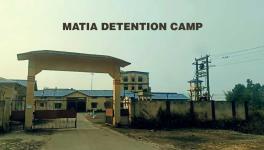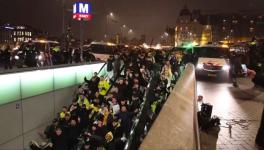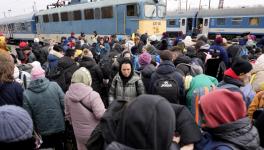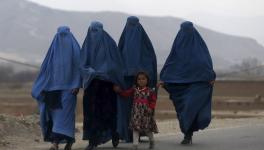Going Beyond the Issue of Aviation Safety in the Diversion of Ryanair Flight 4978
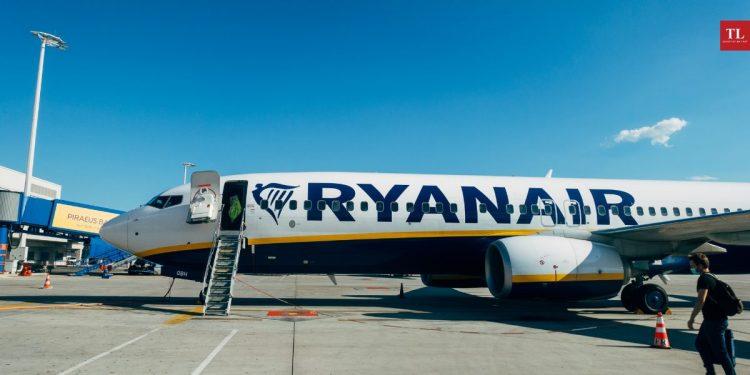
Examining the legal violations committed by Belarus in its diversion of an international flight Ryanair plane, forcing it to land in Minsk, and arresting two of its passengers in May, POOJA V underscores the oft-seen denial by States of involvement in activities in violation of international law and explores the plausible options for enforcing responsibility in such instances.
—-
The diversion of the international passenger flight Ryanair Flight 4978, midway from Greece on way to its destination in Lithuania, to Minsk in Belarus, and the subsequent detention of Belarussian dissident journalist and political activist Roman Protasevich and his Russian girlfriend Sofia Sapega on May 23, attracted widespread condemnation by governments and international organizations alike.
According to the state media in Belarus, its President Alexander Lukashenko had personally given the orders for the flight’s diversion. While the diversion of the flight en route from Athens to Vilnius and its forced landing at Minsk soon after it entered Belarusian violates international aviation law, the detention of the 26-year-old Protasevich, who had been living in exile in Poland since 2019, as well as 23-year-old Sapega only exacerbates the situation.
The incident underscored inter alia the need for a ‘global policeman’ to check disputes over sovereignty in international aviation, the oft-seen denial of state involvement in such incidents, the extent to which free speech is curbed in Belarus, and the prevailing east-west tensions in Europe in recent times.
The entire incident has two angles worth looking at: the potential violations of international aviation conventions committed by Belarus due to the forced landing, and the much graver and more outrageous human rights violations committed by Belarus against the detained pair.
Holding Belarus responsible for the diversion
The diversion of Ryanair Flight 4978 seems to be in violation of Articles 3(d) and 4 of the Convention on International Civil Aviation, 1944 (Chicago Convention), in addition to Article 10(1) of the Convention for the suppression of unlawful acts against the safety of civil aviation, 1971 (Montreal Convention). A detailed analysis of the plausible violations under these Conventions can be viewed here.
At this juncture, it is important to note that even if the bomb threat, under the pretense of which the flight had been forcibly diverted by Belarus, had turned out to be genuine after an investigative committee’s report or the International Civil Aviation Organization’s fact-finding report which is due in September 2021, Belarus would still be in breach of its international obligations. This is because its responsibility extends beyond the civil aviation angle, and includes the violations of the rights of Protasevich and Sapega.
Human Rights Considerations
Belarus has ratified both the Convention against Torture and Other Cruel Inhuman or Degrading Treatment or Punishment (CAT) and the International Covenant on Civil and Political Rights (ICCPR). The detention of Protasevich and Sapega is in violation of Article 19 of the ICCPR. Penalizing a journalist and his partner for being critical of the regime would not constitute a “valid restriction” of freedom of expression and would be tantamount to violation of the aforesaid article.
Even the Office of the UN High Commissioner for Human Rights (OHCHR) condemned the arbitrary detention of Protasevich for exercising his rights that are protected under international law. OHCHR spokesperson Rupert Colville noted that “Under human rights law, the mere act of organizing a peaceful assembly should never be criminalized under domestic laws, including counterterrorism laws, and the arrest or detention of someone as punishment for the legitimate exercise of their rights to freedom of opinion and expression and freedom of assembly, is considered arbitrary.” Such arbitrary arrest is in violation of Article 9(1) of the ICCPR.
Even the International Court of Justice (ICJ), in its judgment in the case concerning U.S. Diplomatic and Consular staff in Tehran ruled that such a wrongful deprivation of liberty would be in contravention of the principles of the Charter of the United Nations, as well as the fundamental principles enunciated in the Universal Declaration of Human Rights.
Also read: Triumph of International Law
Additionally, concerns have also surfaced about the safety of Protasevich owing to the multiple appearances he has made in state or pro-government media, in some of which he has confessed to “organizing mass riots” in Minsk, and expressed regret for his political actions. These appearances have appeared involuntary, and his confessions are very visibly given under duress.
Such forced confessions are in violation of Article 1 of CAT and cannot be justified under any circumstances, as per Article 2(2). Further, the prohibition of torture has attained the status of jus cogens or peremptory norm of general international law from which no derogation can be tolerated.
Recently, the pair was moved to house arrest, which merits discussion on whether the violations by Belarus have ceased. However, even though house arrest is a better alternative to imprisonment, it is still a significant restriction on a person’s rights and freedoms. Even under house arrest, liberty is curbed as a person is restricted in physical freedom and personal integrity, in addition to being completely or partially isolated from society. Therefore, every violation discussed earlier would still apply, albeit to a slightly lesser degree.
Previous human rights violations
Such arbitrary arrests by the government of Belarus have been brought to light time and again, and demand urgent international action.
Belarus has previously been found in violation of the ICCPR on numerous occasions. The situation was especially grave during the August 2020 re-election of Lukashenka, who has been president since 1994. Prison conditions remain poor, posing threats to the life and health of the incarcerated, several of whom are political prisoners. Gross human rights violations, ranging from arbitrary or unlawful killings and deaths to torture have been recorded.
Even the observations by the European Court of Human Rights in Koktysh v. Ukraine (60 EHRR 6) and Puzan v. Ukraine, [2010] ECHR 222 clearly point out the pathetic state of human rights violations in Belarus.
The conundrum of enforcing responsibility and the way forward
With the ICAO’s report pending, it should be noted that a breach of the aforesaid treaty obligations of Belarus plainly gives rise to its responsibility for an internationally wrongful act. In which case, Belarus has an obligation under Articles 30(a) and 31 of the International Law Commission’s Draft Articles on the Responsibility of States for Internationally Wrongful Acts to cease the wrongful conduct and make full reparation for the injury caused.
Such a complete reparation is possible only when Belarus accepts its violations and releases Protasevich and Sapega as per the principles laid down in the Permanent Court of International Justice’s Chorzów Factory judgment. A mere change in their sentence from detention to house arrest would not constitute reparation.
In the continuance of failure to release the pair, Poland and others nations capable of enforcing the responsibility must enforce Belarus’ responsibility by resorting to countermeasures (several States have already put sanctions and other restrictions in place), among other means. However, this might escalate the dispute, and might also prove to be ineffective since alternative trading partners such as Russia are available.
The reliance on Article 51 of the UN Charter also seems to be inadequate when seen in the backdrop of the UN Security Council’s measures after the Lockerbie bombing. (In that case, six years after Security Council passed a resolution urging Libya to surrender the bombing suspects, imposing sanctions against Libya against the delivery of the two, Libya finally extradited the men. After a further three years, it accepted civil damages in conformity with international civil law and agreed to pay compensation to the victims.) Thus, filing an application before the ICJ would be a mere formality. This avenue is not completely closed, albeit Belarus has expressed reservations under Article 14 of the Montreal Convention (Article 30 of CAT and Article 84 of the Chicago Convention still provide for it).
The recent turn of events, including the shifting of the pair from detention to house arrest, and Protasevich’s appearance on social media earlier this month makes it seem like using the journalist is being used as a prop, since using the telephone or the Internet during house arrest is banned under the Belarusian legislation.
Despite this, the incident does highlight the mistreatment meted out to dissidents in Belarus under the Lukashenko regime. Since Belarus has constantly been in violation of human rights, knocking the door of the International Criminal Court (ICC) is also a plausible option. In the event of that happening, even though Belarus is not a state party to the ICC, the latter may be able to exercise jurisdiction to investigate and prosecute the crimes in Belarus by following the Myanmar precedent. What that means is that even the conduct of a non-state party can be prosecuted in the event of crimes against humanity of deportation and persecution.
Despite several perspectives on the incident and its implications, it should invite immediate attention from the international community to clearly demonstrate that violations of international law bear consequences, and ensure that Belarus does not get away with paying civil damages as had happened in the Lockerbie bombing case.
(Pooja V is a student at the National Law Institute University. She is interested in human rights law, dispute resolution and policy reforms. The views expressed are personal.)
Get the latest reports & analysis with people's perspective on Protests, movements & deep analytical videos, discussions of the current affairs in your Telegram app. Subscribe to NewsClick's Telegram channel & get Real-Time updates on stories, as they get published on our website.









